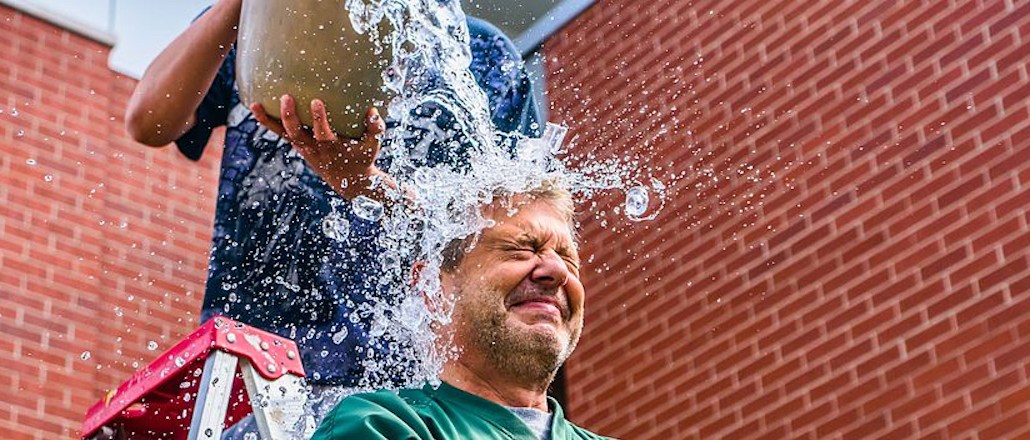
You’d be forgiven for thinking you woke up in 2014: The #IceBucketChallenge is trending once again.
People are revisiting the viral video stunt, which raised $115 million to fight motor neurone disease, after the charity behind it made a breakthrough with those funds: On the two year anniversary of the Ice Bucket Challenge, ALS Association has identified a new gene that causes it.
At Project MinE, a team of 80 worldwide researchers conducted the largest-ever study of amyotrophic lateral sclerosis with over 15,000 patients. Here they linked a gene known as NEK1 to familial ALS, which accounts for around 10 percent of cases.
Following the news, Twitter users have been re-sharing images and videos of their previous icy escapades — which attracted celebrities like Cristiano Ronaldo and Ashton Kutcher.
ALS — also known as motor neurone disease — affects the nervous system in the brain and spine. Those affected slowly lose muscle control and can be fully paralysed as little as two years after they are diagnosed.
The research project is one of six funded by Ice Bucket Challenge donations. That summer, 17 million people filmed themselves being drenched in icy water. One in six British people took part at the time. Meanwhile, the U.K. charity Motor Neurone Disease Association also received £4 million ($5.2 million) in donations from a Kickstarter page.
Other charities that have found success with so-called “slacktivism” campaigns include Cancer Research U.K., which received £8 million after people nominated friends to take a no-makeup selfie.
However, research carried out by John Hopkins Carey Business School the found that in many cases social media buzz does not often translate to donations. Only 64 percent of the 3,500 people in the study who broadcasted a pledge actually followed through with the cash.
#IceBucketChallenge @NDmom @espngolic @Espngreeny pic.twitter.com/92Vb6YqZhA
— StacyGSGreenberg (@StacyGSG) July 27, 2016
https://twitter.com/JulieS/status/758243476752441344
Great news that #IceBucketChallenge ? raised led to breakthrough for @alsassociation. Re-live @CCGilesYork's turn ? pic.twitter.com/JsONPpJNgu
— Sussex Police (@sussex_police) July 27, 2016
We had a blast doing the #icebucketchallenge in 2014. So glad to hear that so much good came from this movement. pic.twitter.com/gVFfRliYhL
— Jan Dils, Attorneys at Law (@JanDilsAttorney) July 27, 2016
#IceBucketChallenge funds ALS breakthrough ? #UNCMBAs raised $1k+ …Thanks for the assist, @ChapelHillFD! #teamworkhttps://t.co/Pioiz3jqZ2
— UNC Kenan-Flagler (@kenanflagler) July 27, 2016
More in Media

In Graphic Detail: The scale of the challenge facing publishers, politicians eager to damage Google’s adland dominance
Last year was a blowout ad revenue year for Google, despite challenges from several quarters.

Why Walmart is basically a tech company now
The retail giant joined the Nasdaq exchange, also home to technology companies like Amazon, in December.

The Athletic invests in live blogs, video to insulate sports coverage from AI scraping
As the Super Bowl and Winter Olympics collide, The Athletic is leaning into live blogs and video to keeps fans locked in, and AI bots at bay.





